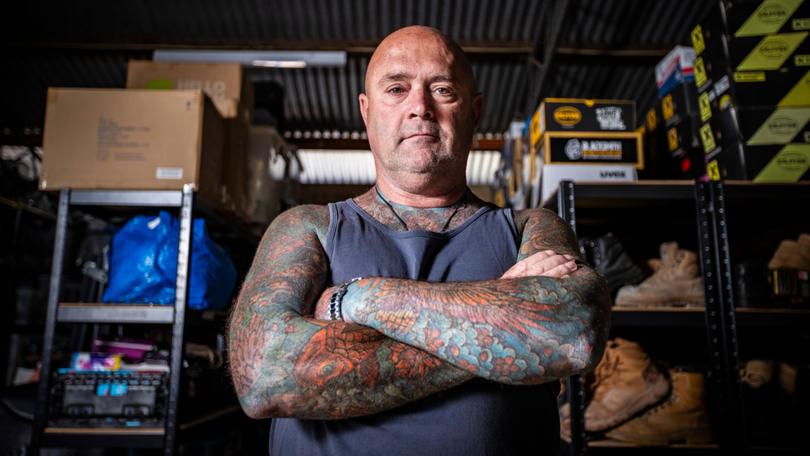SPOTLIGHT: What it is like inside Shalom House, Australia’s hardest and most controversial drug rehab centre
Ben Harvey spent seven days with addicts in Australia’s hardest drug rehab centre to find out whether the country’s most controversial centre is an effective health service or a barely disguised religious cult.

“Gotta get up, mate.”
I didn’t need waking because I hadn’t slept. Nobody does on their first night.
The man coaxing me out of bed around 5am is the son of a Rebels bikie kingpin who had followed his father’s footsteps into the drug world.
Sign up to The Nightly's newsletters.
Get the first look at the digital newspaper, curated daily stories and breaking headlines delivered to your inbox.
By continuing you agree to our Terms and Privacy Policy.The person in the bed next to me, within arm’s reach, is a young father who had started his own art business before his alcoholism tore his life apart.
To my left is a street junkie who, like most people in the house, has nowhere else to go after ripping off every family member and friend in his quest for a fix.
In the kitchen, a half-a-dozen men in hi-vis are quietly making themselves coffee in preparation for 30 minutes of silent Bible reading.
One of them, Brett Barrey, was in the news a few years ago courtesy of his career as a dine-and-dasher who fled restaurants without paying his bill.
Watching him share a joke over a cup of International Roast, it’s tempting to think of him as a rogue rather than a hardened crim.
Then I recall that on his last attempted culinary heist, Brett was carrying a bag containing a sawn-off shotgun and balaclava.
“You get any sleep?” he asked with a grin as I walked upstairs.
It was my first morning in Shalom House — Australia’s hardest drug rehabilitation centre.
Shalom House is the creation of Peter Lyndon-James, a self-styled Colonel Kurtz of the drug rehab world.
In and out of jail since the age of nine, he was one of Australia’s most prolific child criminals before parleying that experience into a career as one of the country’s most productive drug dealers and users.
“I woke up one day and the police were in my house and they had a shotgun pointed at my wife’s head,” the 53-year-old recalls.
“I knew I didn’t want that life anymore.”
It’s a hard life to quit but Lyndon-James says he had some help.
He doesn’t like the phrase “finding Jesus” because “Jesus isn’t missing”, preferring to describe the moment God spoke to him as “being nuked”.
Lyndon-James quickly started making good on a heavenly promise to atone for the damage he caused in the first half of his life.
He quit drugs and spent years volunteering at different rehab services to work out which tactics were most effective at conquering addiction.
In 2012 he bought a home in the Swan Valley and welcomed a handful of recently released prisoners. It was the first Shalom House.
The tag “Australia’s hardest” came quickly.
Few people graduated from the early iterations of Shalom’s five-stage program, which has atonement, physical labour and the bible as its backbone.
“He has softened over the years and I think it started happening after he became a grandfather,” Lyndon-James’ brother Gavin explained.
Gavin was 11 years old when Peter first injected him with drugs.
Startlingly, that is not the worst thing Shalom’s founder admits to.
“I have done some terrible things and I admit to every one of them and I accept they were my decisions,” Lyndon-James says.
“Anyone coming into Shalom needs to own their own addictions and accept that nobody forced them to put the pick in their arm or pop the pill.”
He says he accepts addicts who have hit the wall.
Whose only alternatives are an emergency department, psychiatric ward, prison or a morgue.
“There are no gates or locks, people are free to go any time they want,” he says. “It’s a hard program and if someone has a life raft on the outside they’ll usually go for it.
“Shalom is for the lowest of the low. People who have nobody to turn to and have come to the end of the road.”
The road’s end is clearly a crowded place because today there are 160 addicts living across Shalom’s properties, all of which are, ironically, within spitting distance of the wineries and breweries that litter the Swan Valley.
Up to 18 people share as few as four bedrooms and two bathrooms in each of Shalom’s homes.
Ex-bikies, gangsters and career criminals live with alcoholic professionals, ice-addicted primary school teachers and sportspeople.
For the next seven days, they would be my roommates, workmates and dinner companions as I sought to find out whether the country’s most controversial rehab centre is an effective health service or a barely disguised religious cult.

